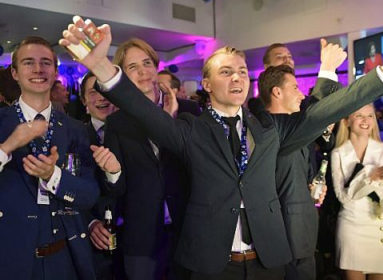
By Harry Weller
Not long ago, I read a Ledger article about Nitsana Darshan-Leitner, the executive director of Shurat HaDin, an NGO headquartered in Ramat Gan, Israel, that uses the law to thwart anti-Israel activities and punish terrorists, their sponsors and rogue nations threatening our freedom (“And Justice For All,” Ledger, March 14, 2014). Coincidentally, with retirement in the not-to-distant future, I have given serious thought to using my 30 years as an appellate attorney to become a more involved advocate for Israel. Consequently, during my December teaching stint at Bar-Ilan Law School, I set up a meeting with Rachel Weiser, a senior attorney with Shurat HaDin. It was a fruitful meeting for both of us.
Fast forward to the week March 6-13. At Rachel’s urging, I was back in Israel attending Shurat HaDin’s Training Seminar for lawyers from all over the world who shared two passions: working in the law and using their skills to help Israel battle its enemies. The 6-day program covered many topics relevant to the international efforts to delegitimize Israel. Sessions included a review of several aspects of Sokolow v. The Palestinian Authority — in which Shurat HaDin collaborated to obtain a judgment of over $600 million for damages for a terrorist attack in Jerusalem — to the law of war, to issues arising from the security fence, to the claimed right of return, to Israel’s settlement policy. Professor Alan Dershowitz was the seminar’s keynote speaker.
Our first side trip included a tour of the Israeli Supreme Court and a private meeting with its vice president, Elkayim Rubenstein, who explained the many challenges Israel faces when confronting terrorism while remaining a free and democratic nation.
A lecture on the law of war by Attorney David Benjamin provided participants with accurate explanations of the legal doctrines applicable to all wars, that are particularly challenging to comply with when facing asymmetrical conflicts such as the war with Hamas. For example, the term “proportionality” or “proportional response” is warped by Israel’s enemies, misinterpreted by the press, and even misperceived by some American leaders — all to Israel’s detriment.
In one remarkable video, Benjamin illustrates the extraordinary methods Israel used during the most recent Gaza war to address the problem of civilians acting as human shields. [See it for yourself at https:\\www.youtube.com/watch?v=A0mtGby30p4.] It was illuminating to learn that, despite the criticism Israel faces when forced to fight in Gaza, it is internationally recognized for its proven ability to reduce the ratio of civilians to fighters killed to lows never before witnessed in warfare. After hearing from Benjamin, my fellow program participants and I are now well armed to refute claims that Israel acts “disproportionately” against its enemies.
Benjamin, who had advised the IDF during the last Gaza war, made it abundantly clear that Israel does not undertake such extraordinary methods to protect Gazans for the purpose of avoiding international criticism. Rather, first and foremost, Israel acts in this manner to protect the neshamot (souls) of its own soldiers. It is enough for the IDF that avoiding civilian casualties, even at the risk of its own soldiers, is the right thing to do. For me this outlook is a source of enormous pride and inspiration.
At the military court, Judge Menachim Lieberman explained how criminal cases are handled in disputed territories under Israeli military supervision. Israel does not have a jury system in either civilian or military courts, so all trials are held before a three-judge panel. Other than that, the American lawyers in the group were hard-pressed to see a difference between Israel’s military tribunals and our own courts. There, as here, a defendant has the right to remain silent, the right to counsel and, if they cannot afford it, there is a system for providing counsel without charge. Just as in Connecticut, 99 percent of all cases are resolved through the plea bargaining process.
On the litigation side, I was fascinated with the discovery process in Sokolow v. The Palestinian Authority. I was amazed by the litigants’ ability to uncover documents that revealed who was financially responsible for the attack, and a letter that provided a direct link between Yasser Arafat and the attack’s organizer. A troubling aspect of this session was the fact that, after a suicide attack, the Palestinian Authority, through financial sleight-of-hand, starts paying a monthly salary to the terrorist or his/her surviving family.
It was eye-opening to learn about the role of international banking in funding terrorism. What became clear to me was that the civilized world can accomplish much in the war against terror if they can stem the flow of illicit funds from state sponsors of terrorism to their clients. One way to do so is to pass and enforce laws that make financial institutions liable for damages caused in any attack funded through them. Financial accountability forces banks and other financial players to open their eyes to the transactions that flow through their accounts. Likewise, laws that hold international companies liable for assisting terrorist organizations were a vital tool employed by Shurat HaDin when it prevented a flotilla organized to break the blockade of Gaza from leaving Greece.
We also had several sessions on the BDS movement. We learned about successes passing legislation in several states that prevent companies that boycott Israel from receiving government contracts. It was heartening to learn that in the United States BDS is faltering. It was equally troubling that in Europe BDS continues to have momentum.
The most chilling presentation came from Dr. Bruce Bechtel, who outlined North Korea’s role in arming Iran and, through Iran, its terrorist proxies. All of Iran’s nuclear development in recent years is the product of North Korean expertise, as is Iran’s progress developing liquid-fueled rockets. These rockets will soon be capable of reaching American soil. North Korea has constructed the underground bunkers that shield Iran’s nuclear facilities, built the tunnels used by Hezbollah to protect their rockets in Lebanon, and provided technology for Hamas’ terror tunnels. Thanks to Iran’s largesse, North Korea’s missile technology has been shared with Hezbollah, Hamas and Syria to name but a few customers. North Korea not only supplies Syria with tanks, it also teaches the Syrian Army how to operate them and mans the facilities that maintain them. The breadth of weaponry being provided is as staggering as it is distressing. Notably, the relationship between Iran and North Korea is so intimate that North Koreans have their own resort in Iran.
Another poignant session was held in the Border Police headquarters at the checkpoint between Bethlehem and Jerusalem. Here, a team of border police and soldiers monitor a section of the line — including the wall, fence and less prominent structures — separating Israeli-controlled territory from an area controlled by the Palestinian Authority. The job is as sensitive as it is intense. Each day, from 4 to 7 a.m., 7,000 Palestinian workers enter Israel through this checkpoint. Moreover, this flow of traffic is important to the economies of both sides.
The commander and his troops fully appreciate the fact that “99.99 percent of those crossing over are coming to do honest work.” They are also sensitive to the fact that passing through the checkpoint each day is cumbersome and stressful. The job is intense because, as the commanding officer pointed out, “We’re not perfect and if we make one mistake people could die.” Indeed, just the week before, a border police officer was stabbed at this very checkpoint when she left her guarded station to help a woman who appeared to be having difficulty handling a package she was toting into Israel.
The Border Police are fully aware of their responsibility to protect Jerusalem’s civilians, including those Palestinians who pass through the checkpoint and work inside of Israel. Everyone impressed upon me their desire for things to change and the volatility of the area to dissipate. If there was one message that was clear from so many who spoke to us, it was the longing for peace with security for everyone in the area, combined with the resolute commitment to protect Israel until then.
I learned much from this program, which was stimulating and thought-provoking throughout. It also convinced me that if Shurat HaDin has a use for my skills I will gladly share them. Already in the planning stage is a program in July to train the organization’s law student interns on the art of advocacy. The students can then return to their campuses armed with what they learn substantively and be able to express themselves effectively on Israel’s behalf. I was also comforted by being around so many like-minded, smart lawyers from all over the world, and I was inspired by some who are already shakers and movers where they reside.
One other lesson resonated for me above all and reaffirms what I feel every time I visit Israel during a “situation” like the random stabbings occurring now. My visit coincided with that of American soldier Taylor Force, who was stabbed to death that week in Jaffa. As civilians, we often shake our heads and wring our hands when we hear of such senseless brutality and see the horrific carnage wrought by terrorism. Although most of us can’t join the armed struggle, we can choose not to be intimidated. Every time we decide not to venture out and especially not to travel to Israel because of fear, the terrorists win.
Israel is a shining example of a society under constant threat that goes on with the rhythms of daily life and refuses to be intimidated. What is most amazing is that Israel perseveres while remaining true to democratic principles and the rule of law. This is something to celebrate, honor and share.
Harry Weller has served as an appellate prosecutor in the Chief State’s Attorneys Office since 1985. A resident of West Hartford, he is an active member of Beth David Synagogue. Weller and his wife, Robyn, are the parents of two daughters, one living in West Hartford and the other living with her husband and son in Jerusalem.








 Southern New England Jewish Ledger
Southern New England Jewish Ledger









